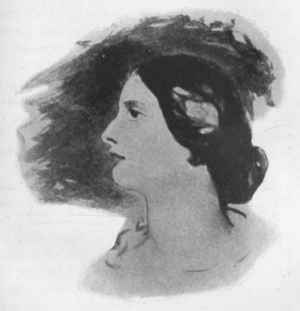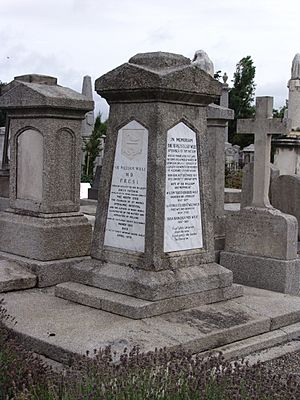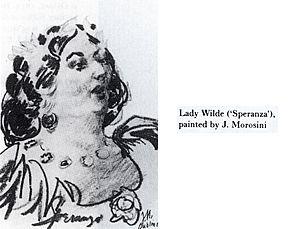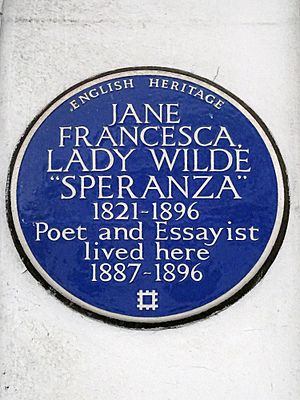Jane Wilde facts for kids
Quick facts for kids
Jane Wilde
|
|
|---|---|
 |
|
| Born | Jane Francesca Agnes Elgee 27 December 1821 Wexford, Ireland |
| Died | 3 February 1896 (aged 74) Chelsea, London, England |
| Resting place | Mount Jerome, Dublin |
| Pen name | Speranza |
| Occupation | Poet, writer |
| Language | English |
| Notable works | Ancient Legends Mystic Charms & Superstitions of Ireland |
| Spouse | |
| Children | Oscar Wilde Willie Wilde Isola Wilde |
| Relatives | John Elgee (grandfather) Robert McClure (cousin) Basil Maturin (first cousin, once removed) |
Jane Francesca Agnes, Lady Wilde (born Elgee; 27 December 1821 – 3 February 1896) was an Irish poet. She used the special writing name Speranza. She also supported the movement for Irish independence. Lady Wilde was very interested in Irish folktales and helped collect them. She was the mother of famous writers Oscar Wilde and Willie Wilde.
Contents
Her Life
Jane was the youngest of four children. Her father, Charles Elgee, died when she was only three years old. This meant she mostly taught herself. People say she learned 10 languages by the time she was 18!
On 12 November 1851, she married Sir William Wilde in Dublin. He was an eye and ear surgeon who also studied folklore. They had three children:
- William Charles Kingsbury Wilde (born 1852)
- Oscar Fingal O'Flahertie Wills Wilde (born 1854)
- Isola Francesca Emily Wilde (born 1857)
Her oldest son, William, became a journalist and poet. Her younger son, Oscar, became a very successful and well-known writer. Sadly, her daughter Isola died as a child from a fever. Jane was also the grandmother of Oscar's sons, Cyril and Vyvyan Holland, and Willie's daughter, Dorothy Wilde.
When her husband died in 1876, the family found out he didn't have much money left. Jane Wilde, who was now called Lady Wilde (because her husband had been knighted in 1864), moved to London in 1879 to be with her sons, Willie and Oscar. She became well-known in writing groups there. She lived with her older son and didn't have much money. She earned extra money by writing for popular magazines and creating books based on her late husband's research into Irish folklore. One of her books was Ancient legends, mystic charms, and superstitions of Ireland (1887). Her poems are thought to have influenced her son Oscar's writing. For example, his poem 'Ballad of Reading Gaol' has been compared to her poem 'The Brothers'.
In January 1896, Lady Wilde got very sick with a chest illness. As she was dying, she asked to see Oscar, who was in Reading Prison. Her request was not allowed. She died at her home in Chelsea on 3 February 1896. Her funeral was held on 5 February at Kensal Green Cemetery in London. Oscar paid for it because her older son, Willie, had no money. She was buried without a special headstone in a shared burial area.
In 1996, she was remembered with a plaque on Sir William Wilde's grave in Dublin. It called her 'Speranza of The Nation, writer, translator, poet and nationalist, author of works on Irish folklore, early advocate of equality for women, and founder of a leading literary salon'. In 1999, a monument to her, a Celtic cross, was put up at Kensal Green Cemetery by the Oscar Wilde Society.
Activism
Lady Wilde was the niece of Charles Maturin. She wrote for a group called the Young Ireland movement in the 1840s. She published poems in a newspaper called The Nation using her writing name Speranza. Her writings supported Ireland becoming independent and were against British rule. People sometimes called her "Speranza of the Nation".
Charles Gavan Duffy was the editor of the newspaper when "Speranza" wrote an article calling for an armed revolution in Ireland. The government offices in Dublin Castle closed the newspaper and took Charles Duffy to court. He refused to say who wrote the article. "Speranza" reportedly stood up in court and said she wrote it. Even though her confession was not accepted by the authorities, they permanently closed the newspaper.
Jane was also an early supporter of women's rights. She worked to get better education for women. She invited Millicent Fawcett, who supported women's right to vote, to her home to talk about freedom for women. She was happy when the Married Women's Property Act of 1883 was passed. This law stopped women from losing control of their money and property when they got married.
Works
- Wilde, Jane (1888). Ancient Legends Mystic Charms & Superstitions of Ireland. ISBN 9783849673604. https://www.libraryireland.com/AncientLegendsSuperstitions/Contents.php. Retrieved 16 September 2022.
Biographies
- In 1911, the American writer Anna de Brémont published a book called Oscar Wilde and His Mother. She said she was a close friend of Lady Wilde.
- Mother of Oscar: The Life of Jane Francesca Wilde, by Joy Melville, John Murray (1994)
- Wilde's Women: How Oscar Wilde Was Shaped by the Women He Knew, by Eleanor Fitzsimons, Gerald Duckworth & Co Ltd (2015)
- A Critical Biography of Lady Jane Wilde, 1821?-1896, Irish Revoltionist, Humanist, Scholar and Poet, by Karen Sasha Anthony Tipper, Edwin Mellen Press (2002)
See also
 In Spanish: Jane Wilde para niños
In Spanish: Jane Wilde para niños
 | James B. Knighten |
 | Azellia White |
 | Willa Brown |




